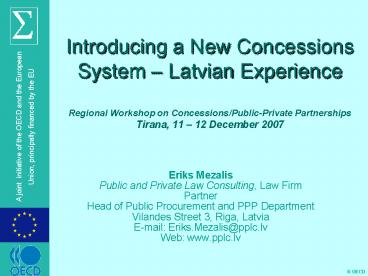Introducing a New Concessions System - PowerPoint PPT Presentation
Title:
Introducing a New Concessions System
Description:
Title: Master Slide Author: drouillon_f Last modified by: drouillon_f Created Date: 11/23/2006 10:03:04 AM Document presentation format: On-screen Show (4:3) – PowerPoint PPT presentation
Number of Views:46
Avg rating:3.0/5.0
Title: Introducing a New Concessions System
1
Introducing a New Concessions System Latvian
ExperienceRegional Workshop on
Concessions/Public-Private Partnerships Tirana,
11 12 December 2007
- Eriks Mezalis
- Public and Private Law Consulting, Law Firm
- Partner
- Head of Public Procurement and PPP Department
- Vilandes Street 3, Riga, Latvia
- E-mail Eriks.Mezalis_at_pplc.lv
- Web www.pplc.lv
2
Geographical situation of Latvia
- Location Eastern Europe
- Territory 64,6 000 square kilometers
- Population 2,5 000 000 inhabitants
- Capital Riga (800 000 inhabitants)
- Borders with Lithuania, Estonia, Russia, Belarus
- Baltic See border 1840 km
3
(No Transcript)
4
Political and Economical situation
- Joined EU in 01.05.2004.
- Permanent right wing government
- Strong political will to introduce PPP
- High demand for different public services and
works - High budget constraints
5
PPP history in Latvia
- 1995 2000 unrecognized PPPs
- The operation of e system of Register of
Enterprises - Operation of canteens in schools, hospitals and
universities across Latvia - Waste treatment services in municipalities
- Contracts awarded by Public Procurement Contracts
Law - No separate legislation regarding Concessions
6
Legislative development
- 20.11.2000 Concessions Law
- Lack of regulation of many necessary aspects
- Consequences
- legal uncertainty
- low courage to step into concessions agreements
- low interest from investors.
7
Legislative development (continued)
- 2002. 2005. A number of policy documents
regarding PPP and concessions - 01.05.2006. (New) Public Procurement Law
- Concessions and long term public contracts still
without appropriate regulation
8
The PPP institutional system and new PPP law
9
Institutional system of PPP
- Ministry of Economics responsible for PPP and
Concessions policy - Investment and Development Agency responsible
for implementation of PPP policy, assistance to
the public partners, gathering the best praxis - Procurement Monitoring Bureau responsible for
procurement issues - No unit directly responsible for PPP accounting
10
What do we want to achieve with PPP law?
- Legal certainty for both public and private
partners - Regulation that promotes
- the justice
- value for money principle in public spending
- flexibility
- The impulse to improve the institutional system
of PPP
11
PPP law the concept and structure
- Definition of PPP
- Concessions contracts
- definition as in EU Procurement Directives
- Procurement contracts
- definition as in EU Procurement Directives
- No business slang DBFO, BOT e.t.c.
12
PPP law the subjects
- State, municipalities and derived public entities
- Bodies governed by public law (according to EU
Procurement Directives) - Public utilities
13
PPP law reaching value for money
- Obligation for public partners to do value for
money calculation and choose right option of
cooperation - Elaborating the system of risk evaluation
14
PPP law contract award procedures
- For subjects that are not public utilities
- open and restricted procedure
- competitive dialogue and negotiated procedure
if appropriate - For subjects that are public utilities
- open, restricted and negotiate procedure with
prior publication - negotiated procedure without prior publication
and competitive dialogue if appropriate
15
PPP law concluding the PPP contract
- The regulation of review procedures
- need for following EU Remedies directive
- The components of PPP contract
- The regulation of Step in process
- the interests of lenders
- potential conflict with EU law
16
Key points
- PPP legal and financial regulation functions
within the legal system of state and is its
integral part - The attention to PPP institutional system also
should be paid - PPP policy making
- control
- advice giving
- examining the appeals
17
Key points (continued)
- In the process of adopting the PPP law, the
interests of all involved parties should be
carefully considered - Communication with society is highly important
18
Key points (continued)
- Experience form other countries should be used,
still critically applying it to local situation - Each person involved in drafting the law should
leave its corporative interests (if any) a little
behind and look to the whole picture
19
Thank you for your attention!

